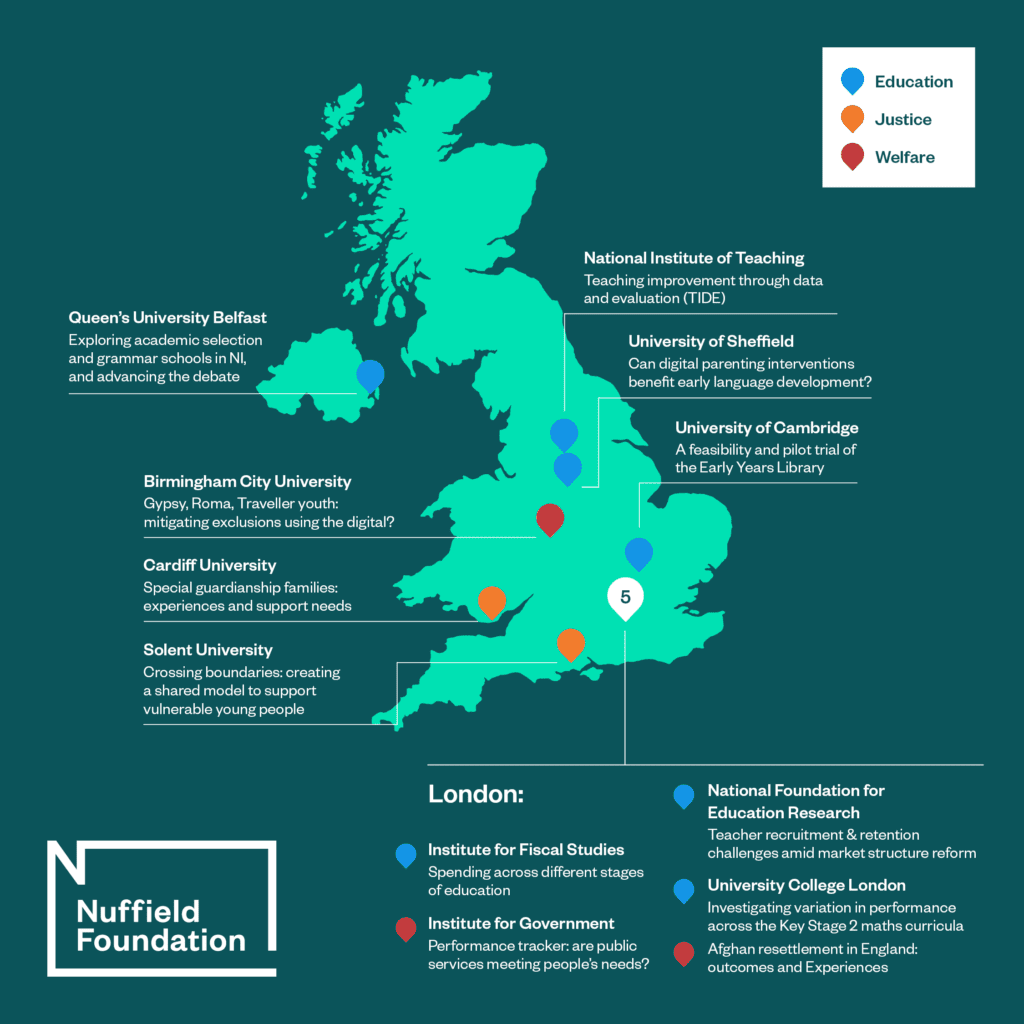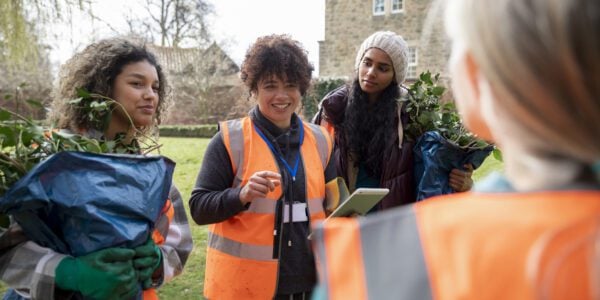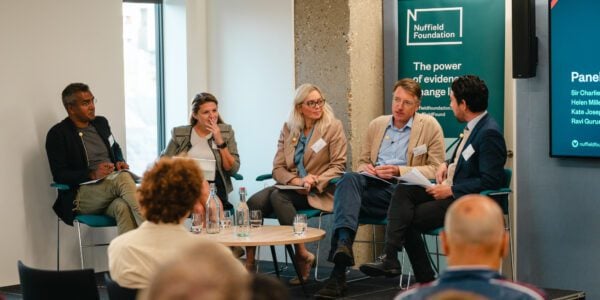We are delighted to announce £5.3m in funding for new research to help change people’s lives
The Nuffield Foundation has awarded more than £5.3 million of funding to new research projects spanning diverse subjects across core areas including:
- teacher training and development
- education spending
- teacher recruitment and retention
- digital exclusion
- refugee resettlement
- public services’ performance.
Our grants are awarded to research that examines the inequalities, disadvantages and vulnerabilities people face throughout their lives, and produces findings that can influence future policy and practice.Nuffield Foundation
UK research grants
Grants have been awarded to universities, institutions, and organisations across the UK:

Details of the new projects include:
- Teaching Improvement through Data and Evaluation (TIDE), led by Dr Calum Davey (National Institute of Teaching)
This research aims to improve outcomes for pupils by improving teacher development practices. Currently, it is difficult to know which teacher development routes and practices to prioritise. This is due to researchers not being able to link professional development with attainment outcomes for pupils. This project will bring together a wealth of strictly anonymised data from the NIoT’s founding trusts to explore how or what approaches to teacher training, classroom practice and CPD impact pupil outcomes. The project is the first of its kind tried at this scale in the UK. - Crossing Boundaries: Creating a Shared Model to Support Vulnerable Young People, led by Prof. Elaine Arnull (Solent University)
This project will identify ways of sharing information to support young people who have been or are at risk of exploitation in Telford and Wrekin. The aim is to work collaboratively and creatively with organisations and the community to impact criminal justice, social care, education and health policy and practice. This addresses the findings from the independent inquiry (IITCSE, 2022). There will be an initial investigation with clear outcomes; it will identify opportunities, places and methods for more effective sharing of information. A model will be developed that can be implemented and tested. - Performance Tracker: are public services meeting people’s needs? Led by Nick Davies (Institute for Government)
This project will expand the analysis of the Institute for Government’s annual Performance Tracker. The annual reports examine the extent to which key public services (hospitals, general practice, adult social care, children’s social care, neighbourhood services, and schools in England; and police, prisons, and criminal courts in England and Wales) are meeting the needs of people across the country, and future pressures and spending choices facing the government. Nuffield’s funding will enable Performance Tracker to provide more responsive analysis which looks at the correlations between funding levels, service provision, and user outcomes. Where possible, this will include analysis of geographic variations to better understand the drivers of national trends. Performance Tracker’s aim is to provide impartial evidence which improves the quality of government decisions on public services and spending, in order to improve outcomes for people across the country. - Afghan Resettlement in England: Outcomes and Experiences, led by Dr Caroline Oliver (University College London)
Since August 2021, when the Taliban took over Kabul, the British Government has evacuated over 22,000 vulnerable and at-risk Afghans to the UK. The Afghan resettlement schemes are under increased scrutiny, in part because of procedural concerns and safeguarding issues. The Chief Inspector of Borders, the Women and Equalities committee, and the Local Government Association have called for independent evidence to inform implementation. The project team will work with Afghan families, Local Authorities, Strategic Migration Partnerships and Refugee NGOs to gather evidence of experiences and outcomes of the resettlement schemes, and will share findings with the All-Party Parliamentary Group on Afghan Women and Children. The research will deliver the assessment of: how the schemes are working, how experiences vary regionally, and how experiences vary by characteristics, especially gender, age, and ethnicity. - Special guardianship families: Experiences and support needs, led by Lorna Stabler (Cardiff University)
Usually granted to a family member, a former foster carer, or someone else known to the child, Special Guardianship Orders (SGOs) are a more common route for children to leave care than through adoption. SGOs can also be made through private law, with or without social work involvement. We know little about the characteristics of these families, outcomes for the children or factors associated with children’s recovery from early adversity. This study will bring together methods from psychology and data science to explore pre-SGO pathways, characteristics, and needs of these children. This picture of families’ characteristics will help shape the support services for SGO families and the commissioning and planning of services for these families across the UK. - Gypsy, Roma, Traveller Youth: mitigating exclusions using the digital? Led by Geraldine Lee Treweek (Birmingham City University)
Gypsy, Roma and Traveller (GRT) young people often experience exclusion and poor outcomes in education and employment. This 30-month study will explore how digital engagement, through use of smart phones, social media and apps might be a mitigation for that exclusion. Working with young people and groups from GRT communities, the project will point to potential routes for inclusion that can be capitalised on by cross UK policymakers at national, regional and local levels, who want to increase opportunity among GRT groups. - Spending across different stages of education, led by Dr Luke Sibieta (Institute for Fiscal Studies)
This project will continue the Institute of Fiscal Studies Nuffield funded work on education spending. The primary objective is to inform decisions about the level and distribution of spending across stages of education. Education is integral to achieving key national priorities, including raising productivity, reducing inequalities, and recovering from the pandemic. Publicly available statistics will be combined with survey data, policy documents, and wider academic literature. Findings will be shared in annual reports. Deep dives into particular areas will be shared in the main report and standalone briefings. The research team will engage directly with stakeholders, scrutinise politicians’ claims and policy proposals, and share data to facilitate further analysis. - Teacher recruitment & retention challenges in England, led by Jack Worth (National Foundation for Educational Research (NFER)
The teacher workforce in England is facing significant challenges of recruiting and retaining enough teachers, particularly in STEM subjects. Resulting shortages are likely to affect pupils’ educational progress negatively. Amid a competitive graduate labour market, the issues and factors associated with attracting and retaining high-quality teachers are constantly changing. Building on previous Nuffield funded research, the project will analyse the latest trends in teacher recruitment, retention, pay and working conditions. It will explore the factors affecting teacher recruitment and retention and the variation in teacher supply by subject, region and schools type. Findings will be shared in two annual reports in 2024 and 2025 and updates made to a data dashboard. This project will provide independent analysis with the aim of informing policymakers and encouraging them to develop solutions illuminated by the research. - Can digital parenting interventions benefit early language development? Led by Prof Danielle Matthews (University of Sheffield)
This project will explore whether a light-touch digital parenting programme can support young children’s language development before school entry. Language skills are fundamental for children’s capacity to learn and flourish at school and beyond. Differences between more and less socio-economically advantaged children are seen as young as 18-months old. This gap widens with age, putting children from less privileged backgrounds at a disadvantage before they start school. A promising new approach to preventing language delay is the delivery of digital parenting interventions that provide caregivers with specific developmental-stage-related strategies to scaffold language development with the addition of video-call support where needed. The research will help the design of better services and direct spending so that more children start school with the language skills needed to thrive. - Exploring academic selection and grammar schools in NI, and advancing the debate, led by Joanne Hughes (Queen’s University Belfast)
Northern Ireland provides almost all its post-primary education through a system of grammar and secondary schools. This is despite a substantial body of research demonstrating that, rather than promoting social mobility, academically selective systems can increase inequality and impede social cohesion. This project examines why academic selection endures in Northern Ireland through identifying the political, social and educational factors that sustain academic selection. It will also explore alternative models of post-primary education, including the conditions necessary for change. Through doing so this work will contribute to and promote a debate which reflects the evidence, incorporates the perspectives of people who have benefited from or been disadvantaged by selection, and considers the potential for reform. - Investigating variation in performance across the Key Stage 2 maths curricula, led by Prof John Jerrim (UCL Institute of Education)
This project will investigate the feasibility of constructing separate scores for each of the eight curriculum areas covered within the Key Stage 2 SATs for mathematics (e.g. geometry, algebra and statistics etc). If reliable scores can be generated for each curriculum area, this work will investigate the size of socio-economic, ethnic and gender gaps across different areas of the curriculum. It will consider whether some schools are better at helping pupils build skills in certain areas than others. While in addition, it will consider how relative performance across topics has changed over time, including whether the pandemic lead to greater learning loss in particular areas. If successful, this work should help educators make better use of SATs data to improve teaching, for example by identifying areas where greater professional or curriculum development might be required. - A feasibility and pilot trial of the Early Years Library, led by Prof Sara Baker (University of Cambridge).
High quality early childhood education (ECE) can make a crucial contribution to equal life chances for children. This research seeks to strengthen the quality of ECE in England by studying the potential for training and support around the Early Years Library (EYL: Clarke et al, 2022). The EYL is an open access static website resource for early years practitioners, showcasing approaches to develop young children’s oral language, early academic and social-emotional skills. Researchers will work collaboratively with early years practitioners and implementation experts to co-design a suite of training and support materials, which will then be tested and refined. A pilot study will then test whether the EYL training and support holds promise for improving ECE, and could be rolled out more widely in a suitable format.
The new research grants are part of the second-round of 2023 awards made in November from the Foundation’s Research Development and Analysis Fund to projects across our three core areas of Education, Welfare and Justice.
As an independent Foundation, we offer the freedom to frame questions and enable new thinking to understand and find solutions to the challenges we face. We encourage interdisciplinary and intersectional approaches and look for comprehensive proposals that use rigorous methodology and can make a real difference. As an inclusive funder, we welcome applications from diverse communities and under-represented groups.
We have two application rounds each year for grant funding for research, development and analysis projects in our core domains.








